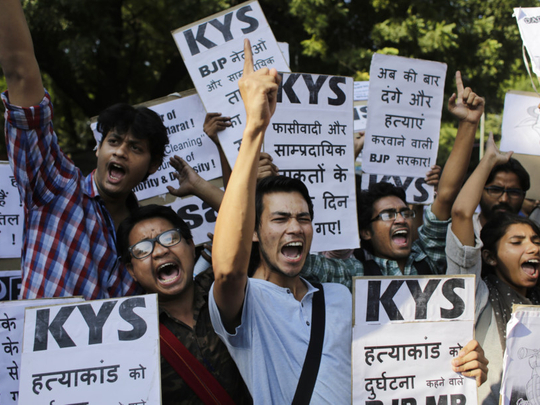
The Narendra Modi-led Bharatiya Janata Party (BJP) government would have done well to nip in the bud the current controversy in India over the murder of a person on the suspicion of him having eaten beef, rather than let it spread its tentacles, reaching unwieldy proportions across the country. It’s been more than 10 days since the lynching of 52-year-old Mohammad Akhlaq at Bisara village in Uttar Pradesh (UP) and the issue has only been getting bigger. Amid rumours that the family had slaughtered a calf, Akhlaq and his son Danish, 22, were dragged out of their house and beaten mercilessly, leading to the man’s death and his son being hospitalised in a critical condition.
The murder has created a nation-wide debate over cow-slaughter, with several BJP leaders supporting a countrywide ban on the slaughter of the animal. Though they do not see eye-to-eye in parliament, a Congress party leader has gone ahead and said his party would extend support to the BJP if it were to bring out a legislation to ban cow-slaughter in the country.
Ironically, in stark contrast to politicians, the Cow Welfare Commission has come out strongly against the militant ways of cow protection. The commission’s chairman Kimti Bhagat, who is also a BJP member, maintains the problem is that cow protection has been linked to religion, which will prove counter-productive. He rightfully states that a ban on cow-slaughter or beef cannot be imposed without taking Muslims along. And that it is required to publicise the economic benefits that can be derived from a cow, as stringent laws alone will not help. Controversies and tensions apart, a Muslim group in the old city of Hyderabad recently made protection of the cow its sole mission. Even while the group says that by not consuming beef, a great religion like Islam will not be diminished, a Sharia scholar too feels diet is something that is best left to the individual, especially in a democratic nation.
Indeed, it is time for Indians to raise their voice against such incidents, where a poor man, who has not harmed anyone, is lynched on the basis of rumours. The country of many religions and cultures cannot be destroyed at the whims of some fanatics. As one sees, it is not a law-and-order issue, but the result of rising hatred against one community by some extremists today, which could be followed by another community tomorrow and then another, unless the society deals with it right now.
The heated politics over the issue has seen BJP members repeatedly referring to illegal cow-slaughter as a reason for heightened communal tensions and a provocation for violence. The Union Home Ministry has only lately stated that such narratives cannot be offered as justification for criminal acts. However, it needed to have stressed that killing a human being over an animal was not rational. The leadership has asked party members to hold forth their comments. The directive by the federal government, asking states to deal strictly with elements trying to weaken India’s secular fabric, has followed. But warnings to loudmouths have been falling on deaf ears, as political leaders, one after another, have been making contentious remarks. The recent ones to join the bandwagon are the ‘swamis’ and ‘sadhvis’ (male and female hermits, respectively), who are labelled as ‘beyond the control of the party’. Then there is the Samajwadi Party leader, who has sought the intervention of the United Nations!
Surprisingly, while Prime Minister Modi has not uttered a word on the issue and has come under attack for his ‘silence’, Akhlaq’s elder son, Sartaj, an aircraft engineer with the Indian Air Force, has stood out despite his personal tragedy. He has been continuously pleading with politicians to refrain from exploiting religious sentiments. He, however, is hurt at the thought that his father, who, he says, helped everyone in the village, was not helped by anyone when he needed them the most.
UP Chief Minister and Samajwadi Party leader Akhilesh Yadav has blamed communal politics for the crime and suggested it was part of a conspiracy to defame his government. He asserted that at a time when the world is marching ahead on the path of progress, some forces are doing politics on communal lines and want to take India and the state backwards.
It’s time the prime minister speaks out against such a barbaric act and puts an end to the rising tide of hatred by declaring that those who do not fall in line shall be persecuted and dealt with severely.
As tension simmers over UP, some right-minded scholars are, thankfully, making the right noises. D.N. Jha, former professor and author of the book The Myth of the Holy Cow says: “The cow has been a political animal in modern India, but it has become more political under the present BJP governments at the Centre and in some states, which are obsessed with beef and cow-slaughter. But the ritual killing of cattle was de rigeur even among Vedic people, who routinely sacrificed cattle and ate their flesh.” Jha adds: “The Indian cow has struggled its way to sanctity. But its holiness is elusive for there is no cow goddess, nor any temple in her honour — though it should not surprise us if some disgruntled elements set up one.”
With beef becoming a big issue, the UP government has sent a report to the Centre at the latter’s behest on the Bisara village incident. Surprisingly, it has refrained from mentioning ‘beef consumption or cow slaughter’ rumours as the trigger for the unfortunate incident. Apparently, the entire controversy is raging even without any clarity on the question whether it was beef or mutton that Akhlaq and his family had stored in their house!
Nilima Pathak is a freelance journalist based in New Delhi.










